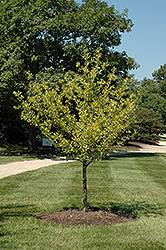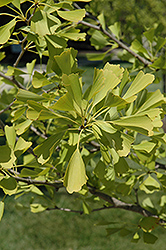It's all about ...
plants

Height: 50 feet
Spread: 40 feet
Sunlight:
![]()
Hardiness Zone: 4a
Other Names: Maidenhair Tree, Yellow Ginkgo
Description:
A large upright and pyramidal shade tree with a distinctively spreading branching habit; light yellow leaves in summer, on ascending branches, turn a richer golden-yellow in fall
Ornamental Features
Aurea Ginkgo is primarily valued in the landscape for its distinctively pyramidal habit of growth. It has buttery yellow deciduous foliage which emerges chartreuse in spring. The fan-shaped leaves turn an outstanding yellow in the fall.
Landscape Attributes
Aurea Ginkgo is an open deciduous tree with a strong central leader and a distinctive and refined pyramidal form. Its average texture blends into the landscape, but can be balanced by one or two finer or coarser trees or shrubs for an effective composition.
This is a relatively low maintenance tree, and is best pruned in late winter once the threat of extreme cold has passed. Deer don't particularly care for this plant and will usually leave it alone in favor of tastier treats. It has no significant negative characteristics.
Aurea Ginkgo is recommended for the following landscape applications;
- Shade
- Vertical Accent
Planting & Growing
Aurea Ginkgo will grow to be about 50 feet tall at maturity, with a spread of 40 feet. It has a high canopy with a typical clearance of 7 feet from the ground, and should not be planted underneath power lines. As it matures, the lower branches of this tree can be strategically removed to create a high enough canopy to support unobstructed human traffic underneath. It grows at a medium rate, and under ideal conditions can be expected to live to a ripe old age of 150 years or more; think of this as a heritage tree for future generations!
This tree should only be grown in full sunlight. It is very adaptable to both dry and moist locations, and should do just fine under average home landscape conditions. It is not particular as to soil type or pH, and is able to handle environmental salt. It is highly tolerant of urban pollution and will even thrive in inner city environments. Consider applying a thick mulch around the root zone in winter to protect it in exposed locations or colder microclimates. This is a selected variety of a species not originally from North America.
This plant is not reliably hardy in our region, and certain restrictions may apply; contact the store for more information.

